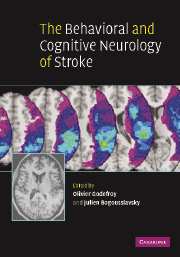Book contents
- Frontmatter
- Contents
- Contributors
- Preface
- 1 Evaluation of cognitive and behavioral disorders in the stroke unit
- Motor and gestural disorders
- Aphasia and arthric disorders
- Hemineglect, Anton–Babinski and right hemisphere syndromes
- Agnosia and Bálint's syndrome
- 14 Cortical blindness
- 15 Bálint's syndrome
- 16 Prosopagnosia
- 17 Object and color agnosia
- 18 Auditory disorders related to strokes
- Executive and memory disorders
- Behavioral and mood disorders
- Dementia and anatomical left/right syndromes
- Index
- References
16 - Prosopagnosia
Published online by Cambridge University Press: 10 October 2009
- Frontmatter
- Contents
- Contributors
- Preface
- 1 Evaluation of cognitive and behavioral disorders in the stroke unit
- Motor and gestural disorders
- Aphasia and arthric disorders
- Hemineglect, Anton–Babinski and right hemisphere syndromes
- Agnosia and Bálint's syndrome
- 14 Cortical blindness
- 15 Bálint's syndrome
- 16 Prosopagnosia
- 17 Object and color agnosia
- 18 Auditory disorders related to strokes
- Executive and memory disorders
- Behavioral and mood disorders
- Dementia and anatomical left/right syndromes
- Index
- References
Summary
General presentation of the disorder
Prosopagnosia is classically defined as an inability to recognize faces of people known to the patient on the basis of visual perception, despite the absence of low-level visual impairments, or cognitive alterations such as mental confusion or amnesia, with a preserved ability to recognize people through other cues: voice or other visual traits such as gait, size, clothes, or even facial features (moustache, scar, blemish) or accessories (ear-rings, eyeglasses). Prosopagnosics also have access to semantic knowledge concerning people.
According to Grüsser and Landis (1991), this condition seems to have been first described by Wigan (1844), in a book in which he expressed his views on the interaction of the two cerebral hemispheres. Wigan stated (pp. 128–9):
A gentleman of middle age, or a little past that period, lamented to me his utter inability to remember faces. He would converse with a person for an hour, but after an interval of a day could not recognise him again. Even friends, with whom he had been engaged in business transactions, he was unconscious of ever having seen (…) it was not till he heard the voice, that he could recognise men with whom he had constant intercourse (…) When I inquire more fully into the matter, I found that there was no defect in vision, except that his eyes were weak, and that any long continued employment of them gave him pain (…). He was quite determined to conceal it, if possible, and it was impossible to convince him that it did not depend solely on the eyes.
Information
- Type
- Chapter
- Information
- The Behavioral and Cognitive Neurology of Stroke , pp. 315 - 334Publisher: Cambridge University PressPrint publication year: 2007
References
Accessibility standard: Unknown
Why this information is here
This section outlines the accessibility features of this content - including support for screen readers, full keyboard navigation and high-contrast display options. This may not be relevant for you.Accessibility Information
- 19
- Cited by
